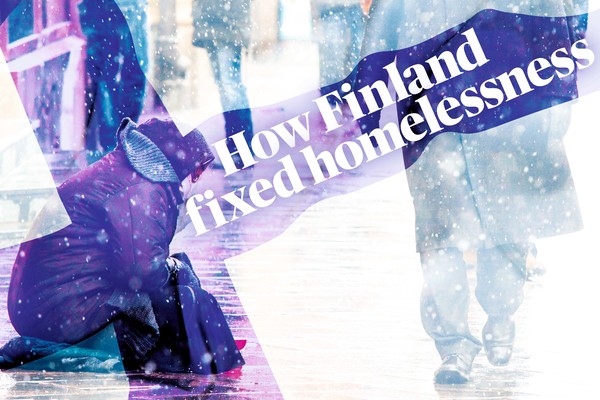You are viewing 1 of your 1 free articles
Burnham picks housing association to run Housing First pilot
Greater Manchester mayor Andy Burnham has picked housing association Great Places to deliver the city region’s Housing First programme.
Under the scheme, the 19,000-home landlord will lead a consortium aiming to rehouse 400 people over the next three years, backed by £7.6m of government funding.
Housing First is a strategy aimed at helping rough sleepers. It involves immediately moving rough sleepers into their own accommodation and then building services around that, rather than progressing them through emergency shelters and temporary accommodation.
The strategy has virtually eliminated rough sleeping in Finland, where it has been adopted wholesale.
In November 2017, the UK government announced £28m for three pilots of Housing First, in the West Midlands, Greater Manchester and Liverpool. The Greater Manchester pilot will cost £1.8m.
Mr Burnham said: “This is the latest step on our journey. Housing First is a proven successful model. Delivering a sustainable and impactful Housing First service across Greater Manchester will be crucial if we are to make good on our promise to address the humanitarian crisis that is homelessness, and rough sleeping in particular.
“Great Places have an ambitious approach and their bold aims match ours – in this day and age no one should be without a home and in Greater Manchester we are doing things differently, choosing to prioritise tackling homelessness as a matter of urgency.”
The Greater Manchester Combined Authority said that Housing First places will be provided in each of the city region’s 10 boroughs and that it hopes to bring more organisations into the partnership in future years.
The project is already supported by other housing associations and other organisations: Riverside, Regenda Homes, Jigsaw Homes, Stockport Homes, Greater Manchester Mental Health, The Bond Board and One Manchester.
Matthew Harrison, chief executive of Great Places, said: “This is really good news for the region and for all the partners involved in the delivery of this project over the next three years.
“This is a consortium that brings significant experience, expertise, passion and commitment and is cross-sectorial, bringing together housing, health, people with lived experience, and the community and voluntary sector.”
Housing First: The seven key principles
- People have a right to a home so Housing First prioritises access to housing as quickly as possible without any conditions other than the willingness to maintain a tenancy. Individuals won’t lose the tenancy if they disengage from or no longer require support.
- Flexible support is provided for as long as it is needed with housing providers committing to long-term, flexible support without a fixed end date.
- The housing and support are separate – so housing is not conditional on engaging with the support. The offer of support remains if the tenancy fails.
- Individuals have choice and control. They have the choice, where possible, about where they live. Accommodation should be pepper-potted and self-contained, unless an individual says they would prefer shared housing.
- Active engagement. Staff proactively engage clients and caseloads are small. Support provided as long as clients need it.
- The service supports people to identify their strengths and goals and to develop skills and knowledge to achieve them.
- A harm reduction approach is used – so individuals who, for example, self-harm are supported to undertake practices which minimise the risk of them self-harming.
Source: Housing First England











